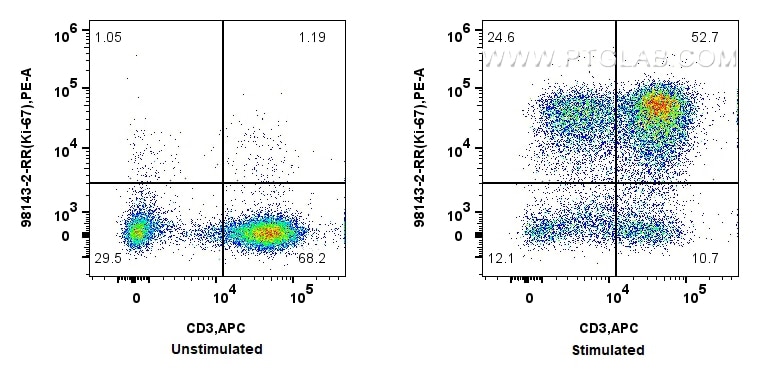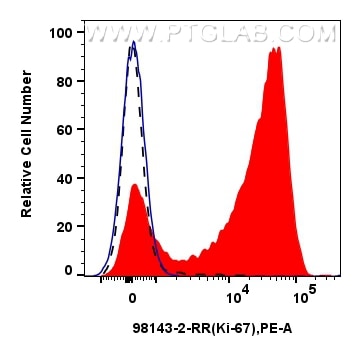Anticorps Recombinant de lapin anti-Ki-67
Ki-67 Recombinant Antibody for FC (Intra)
Hôte / Isotype
Lapin / IgG
Réactivité testée
Humain
Applications
FC (Intra)
Conjugaison
Non conjugué
CloneNo.
241499B1
N° de cat : 98143-2-RR
Synonymes
Galerie de données de validation
Applications testées
| Résultats positifs en FC (Intra) | PHA treated human PBMCs, |
Dilution recommandée
| Application | Dilution |
|---|---|
| This reagent has been tested for flow cytometric analysis. It is recommended that this reagent should be titrated in each testing system to obtain optimal results. | |
| Sample-dependent, check data in validation data gallery | |
Informations sur le produit
98143-2-RR cible Ki-67 dans les applications de FC (Intra) et montre une réactivité avec des échantillons Humain
| Réactivité | Humain |
| Hôte / Isotype | Lapin / IgG |
| Clonalité | Recombinant |
| Type | Anticorps |
| Immunogène | Peptide |
| Nom complet | antigen identified by monoclonal antibody Ki-67 |
| Masse moléculaire calculée | 359 kDa |
| Numéro d’acquisition GenBank | NM_002417 |
| Symbole du gène | KI67 |
| Identification du gène (NCBI) | 4288 |
| Conjugaison | Non conjugué |
| Forme | Liquide |
| Méthode de purification | Protein A purfication |
| Tampon de stockage | PBS with 0.09% sodium azide |
| Conditions de stockage | Store at 2 - 8°C. Stable for one year after shipment. |
Informations générales
The Ki-67 protein (also known as MKI67) is a cellular marker for proliferation. Ki67 is present during all active phases of the cell cycle (G1, S, G2 and M), but is absent in resting cells (G0). Cellular content of Ki-67 protein markedly increases during cell progression through S phase of the cell cycle. Therefore, the nuclear expression of Ki67 can be evaluated to assess tumor proliferation by immunohistochemistry. It has been demonstrated to be of prognostic value in breast cancer. In head and neck cancer, several studies have reported an association between high proliferative activity and poorer prognosis.
Protocole
| Product Specific Protocols | |
|---|---|
| FC protocol for Ki-67 antibody 98143-2-RR | Download protocol |
| Standard Protocols | |
|---|---|
| Click here to view our Standard Protocols |



